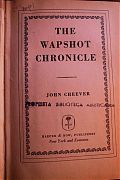
John Cheever
The Wapshot Chronicle
In Cheever, Blake Bailey details the long amount of time it took John Cheever to write The Wapshot Chronicle. Failing one publisher and their advance, he kept at it. When both his parents were dead, he was able to write faster. The Wapshot Chronicle is Cheever’s semi-autobiographical chronicle of growing up and setting out from, twentieth century Quincy, Massachusetts, here renamed St. Botolophs.
St. Botolophs is the starting point. It is an idyll and almost bucolic. Though Moses and Coverly desire to leave, they both carry the town around within them as a sort of guide or barometer. It is Home, the old Wapshots’ family house with heirlooms stored in the attic. St. Botolophs reminded me, for all its pleasantness, of Wolf Solent’s Ramsgard. There are similar descriptions bursting with love of place, building the imaginary out of tender emotions for a finished childhood. There is a similar atmosphere of a sanctuary.
This reverence for St. Botolophs, always going back to it mentally for Coverly and Moses, and staying there, like Leander, is the longest thread in the novel. Blake Bailey wrote how Cheever’s novels were notoriously like a series of short stories, and I felt that in The Wapshot Chronicle, though it generally wasn’t as good as a Cheever short story.
There is a slackness to The Wapshot Chronicle and it lacks the dark irony that make many of Cheever’s short stories so good. It is a sprawling novel and I never knew where it was going to go next. Characters come as quick as they’re gone and point of view shifts between the Wapshot males sporadically with every chapter.
But these faults are made up with Cheever’s descriptions of New York City and small town life and marriage and the troubles of starting out fresh in the world with little to keep you standing upright. The characters that come in flashes were written so vividly, and those that stick around were written with love, especially poor Leander.
[Leander] would like them to grasp that the unobserved ceremoniousness of his life was a gesture or sacrament toward the excellence and the continuousness of things.
And that is a gesture shared with this book.
· · · · · · · · · · · · · · · · · · · ·